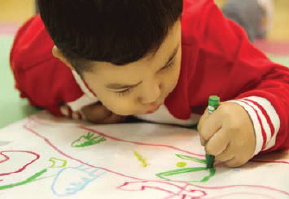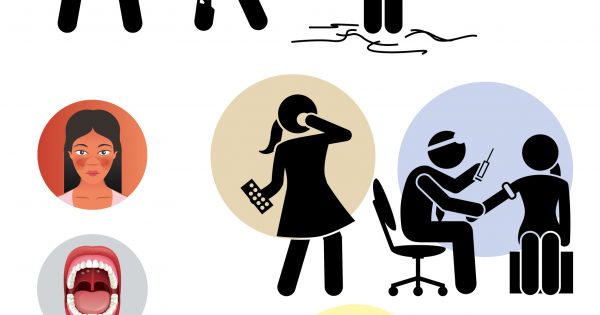Children begin exploring the world very early in life. They intuitively know how to take the smallest object or observation, and turn it into a meaningful experience.
Young children go through a phase in which they will be full of questions. They want to know ‘who, what where, when, how and why’. Like, how do chickens cluck or why is the sky so blue?
Their incessant questions might be aggravating but the children are just trying to learn. This is a necessary part of their learning process.
Preschool, which usually starts when the children are 4 years old, serves to further reinforce and refine their early development and learning experiences. For example, by colouring and drawing, they learn to master their finger muscles and hand-eye coordination. By playing with other children and following classroom rules, they learn social skills. And, of course, there are numerous lessons for developing thinking, communication and problem-solving skills.
All these are achieved within the fun but relatively structured environment of preschool. Nevertheless, there is still plenty of room for parents to optimise their children’s progress by continuing to teach, mentor and coach them at home in a stress-free, enjoyable and age-appropriate manner.
Early Learning Dimensions
What children learn in preschool is critical for laying a strong foundation, not only for formal schooling but also a lifetime of learning.
Physical Skills
Preschool helps children master fine and gross motor skills. Fine motor skills involve small movements, such as grasping something with the thumb and forefinger. Activities that hone fine motor skills include cutting, pasting and painting. Gross motor skills are developed by activities involving bigger movements, such as running, throwing, climbing and dancing.
Intellectual Skills
Opportunities to develop skills such as counting, measuring, sorting, matching, observing and hypothesising will abound. Reading and writing will develop as children are exposed to books, reading aloud and scribbling notes.
Socio-emotional Skills
Preschool helps children establish their place in a community and learn to respect themselves and others. They are made to share not only toys, but also conversation, thoughts and snacks. They are taught how to take turns, include others in play and develop play ‘manners’ as they approach new situations. Part and parcel of all this is learning to manage their feelings and avoid inappropriate outbursts of negative emotion. Preschool is also the time when children can cultivate good moral values that will be important for character building.
|
Did you know? |
|
Play is an important part of learning for children. It allows them to practise skills and learn new concepts by touching, feeling, listening, talking and smelling. It’s always good to have a blend of both academic work and play for a preschooler to learn. By doing this, children learn to love school. |
Learning to Learn
Children learn best in environments that invite exploration, creative thinking and independence. Such traits fuel the investigation of worthwhile topics and the pursuit of intellectual challenges. These are the secrets for success in school and beyond.
The process of discovering how things work is your child’s journey to take alone. Grown-ups are simply there to encourage, challenge and facilitate their development.
Endpoints of Early Childhood Learning
- A love for knowledge, empowered by self-confidence and a sense of independence.
- An inquisitive nature – curiosity encourages the quest for, and appreciation of, knowledge.
- The right attitude to asking questions, solving problems and sharing ideas. Learning becomes a pleasant experience this way.
How You Can Help As Parents
Children who grow up in a good learning environment at home tend to progress faster in preschool. Here are some tips for you.
Share your own love for learning
You are your child’s first teacher. If you want him to learn, you have to first take the initiative to learn and he will imitate.
Offer your support and acceptance
When you encourage and welcome your child’s ideas, he will be comfortable enough to express it without fear of being wrong. Even when it is wrong, you need not scold him nor simply give him the right answer. Rather, take the opportunity to teach him how to find the right answer. This encourages further independent learning in the future.
Provide learning opportunities
Learning experiences can be gained from books and toys as well as other household items. Outings and chit-chats also enhance your child’s perspectives and understanding. Be careful not to overwhelm him. Keep things at a level that is right for his age.
|
A checklist on what you can do as parents |
|
Fit to Learn
In recent years, there have been various moves by the Government to transform our country’s education system. Instead of merely emphasising memory skills for passing exams, we want our children to develop in a more well-rounded way. We want them to have good thinking, creative and problem-solving abilities while also being sound in body, mind and soul.
As parents, we can all lend a helping hand by encouraging our children’s love for learning from an early age and throughout their childhood.
Concurrently, it is important that we care for them in the best possible way so that they can keep learning with minimum disruption. Nutrient deficiencies, anaemias, infections, injuries, psychological problems and unresolved learning difficulties can impede their development. The good news is that the power to prevent these negative situations is in your hands, as you will discover in this issue of Positive Parenting.







Comments